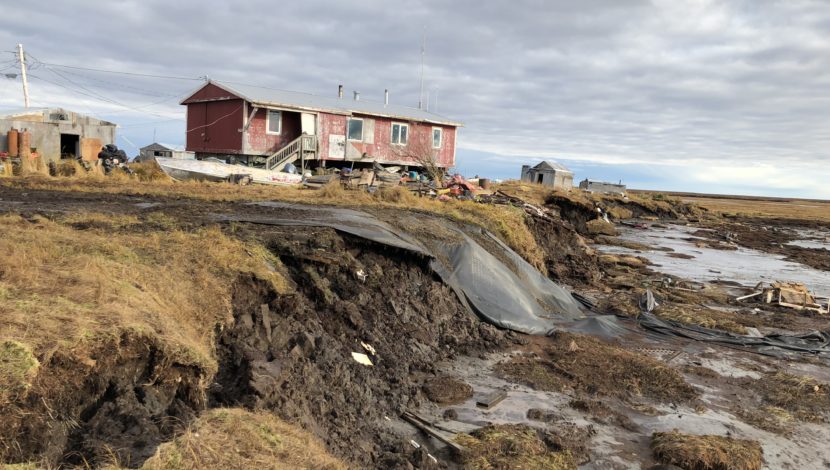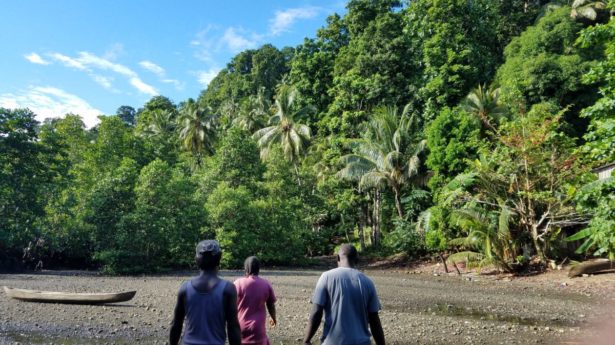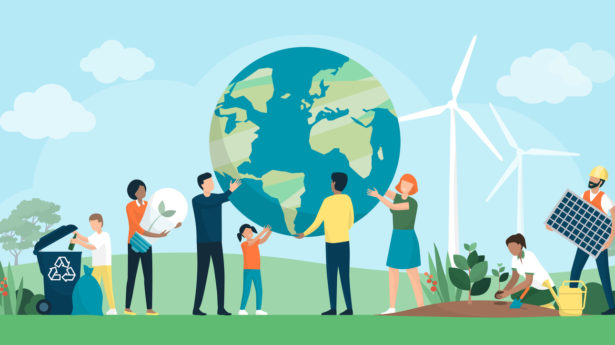The Unitarian Universalist Service Committee advances human rights through grassroots collaborations.
“People Need to Know What is Happening to Us Here”: Two Alaska Villages Face a Climate Emergency

By Salote Soqo on May 18, 2020
As the country wrestles with COVID-19 and states prepare to ease restrictions, communities in the Alaska Native villages of Nunapitchuk and Newtok are facing a public health crisis; this one has been building over several years.
The Alaska Native village of Nunapitchuk, about 20 miles northwest of Bethel in the Yukon-Kuskokwim Delta region of southwest Alaska, is currently facing a combination of two events that pose significant public health risks: flooding due to melting ice and snow, and sinking land due to thawing permafrost.
“This is the worst it’s been in Nunapitchuk. I still live in the house that I grew up in and it’s now surrounded by water: the tundra, the land is full of water during both high tide and low tide,” said Morris Alexie, from the Alaska Native village of Nunapitchuk. Morris shared that the situation is affecting most of the households in the village and “houses which are not affected are elevated, but flood water is almost encroaching them too.”
Morris adds that flood waters are mixing with sewage in his house. Households in Nunapitchuk use a flush tank and haul sanitation system where each household needs to pump out the transfer tanks that fill up in their homes. Flood waters are seeping into these tanks and mixing with sewage, which could contribute to significant health issues.
Essential infrastructures that the village relies on are also crumbling to the ground. Morris explains that the power lines are tightening up because the ground is uneven. As the ground sinks due to thawed permafrost, power line infrastructures sink into the ground, pulling the rest of the line with it and causing the power lines to tighten up. Scientists project that about two and a half million square miles of permafrost could disappear by the end of the century.
Flood waters are causing widespread damage. “We have to catch a boat to move around the village,” said Morris. Other city infrastructures are being affected by flood waters. “Our only gas station, which supplies the village all year round with gas and heat oil is almost underwater. Our city lagoon is breached and is leaking and the school is only a few feet above the lagoon. Our bunkers are underwater. Ninety percent of our fish racks and smoke houses next to the river-bank are under water.”
Heavy rain is making matters worse. For the past week, the village has been experiencing heavy rain, which is expected to continue next week.
Nunapitchuk is only one of the villages facing a public health crisis. About 70 miles west of Nunapitchuk is the Alaska Native village of Newtok, which has been devastated by erosion, flooding and thawing permafrost, a phenomenon referred to as “usteq.” However, in 2019, after decades of work, a new village site was developed. But only some of Newtok’s population have relocated to Mertavick while some are left behind.
Stanley Tom, the former tribal administrator, is one of the many community members that remains in Newtok and tells us that there is a huge waste problem in the village. “Trash has been piling up since 2012. There is human waste all over the place and there are live power lines lying around in the village.”
Since the village decided to relocate, not much has been done to address the failing infrastructures in the old village. And now, those that remain in the village are living with failed infrastructures incapable of serving them. It gets worse as there are no assurances about when more houses can be built in Mertavick to accommodate those remaining.
The solutions are complicated, particularly during this pandemic. Nunapitchuk is one of the many villages in the Yukon-Delta that has put in place protection measures for COVID-19. Currently, there are two known cases of COVID-19 in the region. The village is in the process of declaring a state of emergency to secure funds to assist them.
Both community leaders shared their need to let the rest of the country know about what’s happening in their communities. Morris shares that “we are a part of the United States, and people need to know what is happening to us here.”
State and federal recognition of the ongoing public health crisis in Alaska Native villages is crucial, now more than ever. Immediate responses to these existing threats must be provided to safeguard the health and wellbeing of the villagers.
***
About UUSC: Guided by the belief that all people have inherent worth and dignity, UUSC advances human rights globally by partnering with affected communities who are confronting injustice, mobilizing to challenge oppressive systems, and inspiring and sustaining spiritually grounded activism for justice. We invite you to join us in this journey toward realizing a better future!
Photo Credit: Stanley Tom

